It looks like you're using an Ad Blocker.
Please white-list or disable AboveTopSecret.com in your ad-blocking tool.
Thank you.
Some features of ATS will be disabled while you continue to use an ad-blocker.
share:
RelSciHistItSufi
I have been praying for your daughter & so happy to hear she is improving!
angelchemuel
I hope you are feeling better too!
Love to ALL we need it!
Cheers
Ektar
I have been praying for your daughter & so happy to hear she is improving!
angelchemuel
I hope you are feeling better too!
Love to ALL we need it!
Cheers
Ektar
qalerts.app...

George Soros: United States, European Union Must Remove Putin And Xi From Power
President Trump tells the story of when he had dinner with President Xi at Mar-a-Lago.
“We respects each other.”
“It’s time to protect our own sovereignty.
It’s time to save our own nation from the people who are trying to destroy it. The people controlling Biden, Pelosi and the others.”
- President Trump NOW

George Soros: United States, European Union Must Remove Putin And Xi From Power
President Trump tells the story of when he had dinner with President Xi at Mar-a-Lago.
“We respects each other.”
“It’s time to protect our own sovereignty.
It’s time to save our own nation from the people who are trying to destroy it. The people controlling Biden, Pelosi and the others.”
- President Trump NOW
edit on 12-3-2022 by duncanhidao because: (no reason given)
a reply to: XtheMadnessNow
X-The-Madness-Man, just 'warded you my first star mane!
CareWeMust, don't star me too much, I haven't had positive feedback since '78, it could jolt me into a race-condition.
The entertainment biz was not listed in my litany of DS interests. Shame on me!
I'm not a movie or TV series aficionado. Still, tragically, my most read blog of all time was an interpretation of the movie The Limits of Control. I could probably dig it out of my x-files if anyone has a "need to know" (lol).
www.focusfeatures.com...
I have learned more than I ever wanted to know about the Music Industry DS in recent years. Any consortium that can get Congress to almost unanimously pass a piece of legislation, such as they did the Music Modernization Act of 2018 is totally MMA badd-asss. This legislation essentially ensured continued DS control over music in the digital music streaming era.
Spotify, which is collectively controlled by the big three music labels (Universal, Warner and Sony) cracked down on unsigned artists a little over a year ago. Even before that, it was very difficult for unsigned and even Indie artists to get any traction on Spotify, because the curated playlists were biased toward the big labels (and their affiliate) artists. Spotify went ahead and made it next to impossible for non-label artists by closing the loophole of "fake streaming". Then Covid hit and that probably hurt the unsigned and Indies even more than the signed artists.
Even though the so-called payola system was abolished between labels and radio stations, the best I can tell there is still a heavy money laundering element in music. You take dirty money, invest it in promoting an artist and making hits, and then collect clean money on the other end. Even labels are extremely reluctant to invest clean money in establishing a new artist. They want a new artist to create their own buzz on social media first, which is extremely hard without deep pockets of some kind. It can be done, like Lil' Nas did with the song Old Town Road using TikTok, but its probably easier for someone under six feet tall to make it in the NBA. And now that Lil' Nas is signed, he "came out" with a song called "Industry Baby" (lol).
www.youtube.com...
P.S. In the lyrics he's bragging that nobody can control him, but the theme of the vid is him trying to break out of prison!
X-The-Madness-Man, just 'warded you my first star mane!
CareWeMust, don't star me too much, I haven't had positive feedback since '78, it could jolt me into a race-condition.
The entertainment biz was not listed in my litany of DS interests. Shame on me!
I'm not a movie or TV series aficionado. Still, tragically, my most read blog of all time was an interpretation of the movie The Limits of Control. I could probably dig it out of my x-files if anyone has a "need to know" (lol).
www.focusfeatures.com...
I have learned more than I ever wanted to know about the Music Industry DS in recent years. Any consortium that can get Congress to almost unanimously pass a piece of legislation, such as they did the Music Modernization Act of 2018 is totally MMA badd-asss. This legislation essentially ensured continued DS control over music in the digital music streaming era.
Spotify, which is collectively controlled by the big three music labels (Universal, Warner and Sony) cracked down on unsigned artists a little over a year ago. Even before that, it was very difficult for unsigned and even Indie artists to get any traction on Spotify, because the curated playlists were biased toward the big labels (and their affiliate) artists. Spotify went ahead and made it next to impossible for non-label artists by closing the loophole of "fake streaming". Then Covid hit and that probably hurt the unsigned and Indies even more than the signed artists.
Even though the so-called payola system was abolished between labels and radio stations, the best I can tell there is still a heavy money laundering element in music. You take dirty money, invest it in promoting an artist and making hits, and then collect clean money on the other end. Even labels are extremely reluctant to invest clean money in establishing a new artist. They want a new artist to create their own buzz on social media first, which is extremely hard without deep pockets of some kind. It can be done, like Lil' Nas did with the song Old Town Road using TikTok, but its probably easier for someone under six feet tall to make it in the NBA. And now that Lil' Nas is signed, he "came out" with a song called "Industry Baby" (lol).
www.youtube.com...
P.S. In the lyrics he's bragging that nobody can control him, but the theme of the vid is him trying to break out of prison!
edit on 12-3-2022
by CharlesNPope because: (no reason given)
IARPA research projects::
Big Data - DNA: The Ultimate Data-Storage Solution
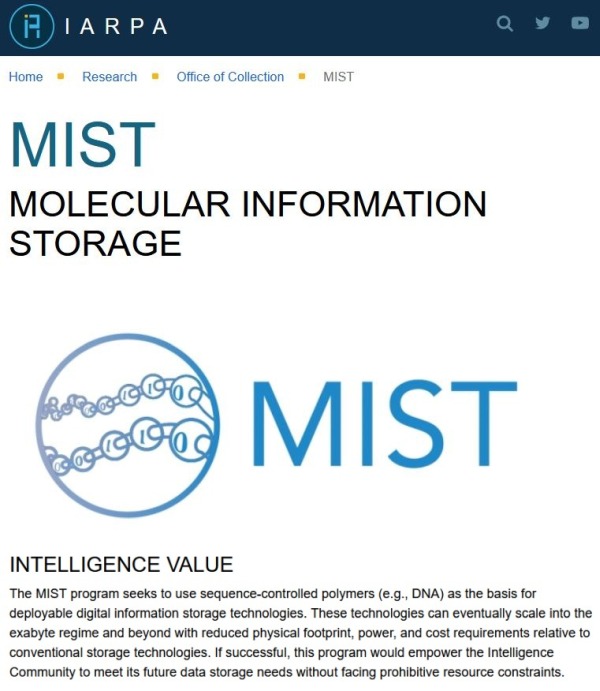
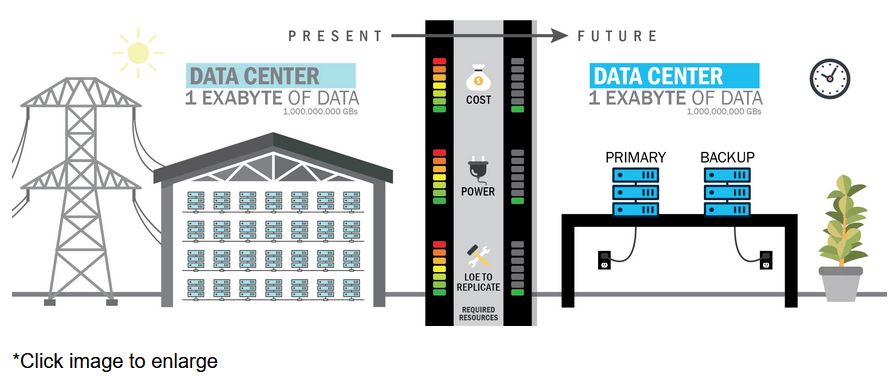
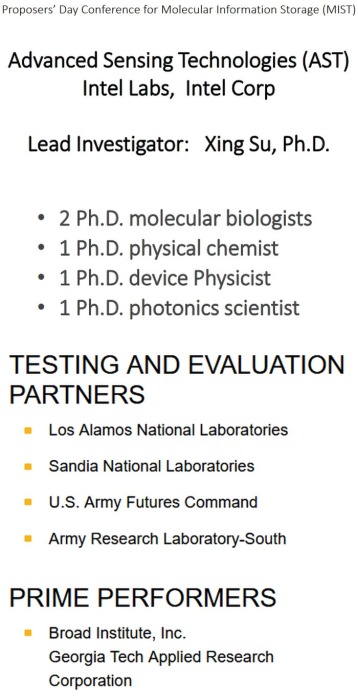
IARPA MIST (Info & presentations from 2018)
Washington State Univ along with Microsoft Research is also involved in the IARPA DNA storage R&D.
From 2016:

Fun GCAT - Bio-security AI-driven software for rapid screening/flagging of “dangerous DNA sequences”, specifically referencing SARS-Cov-2 virus. The program began in June 2017 and will end in February 2022.
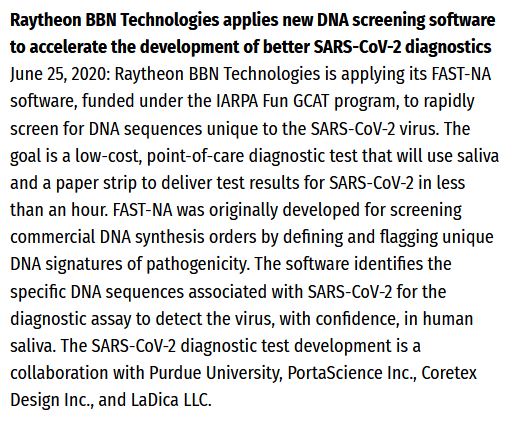
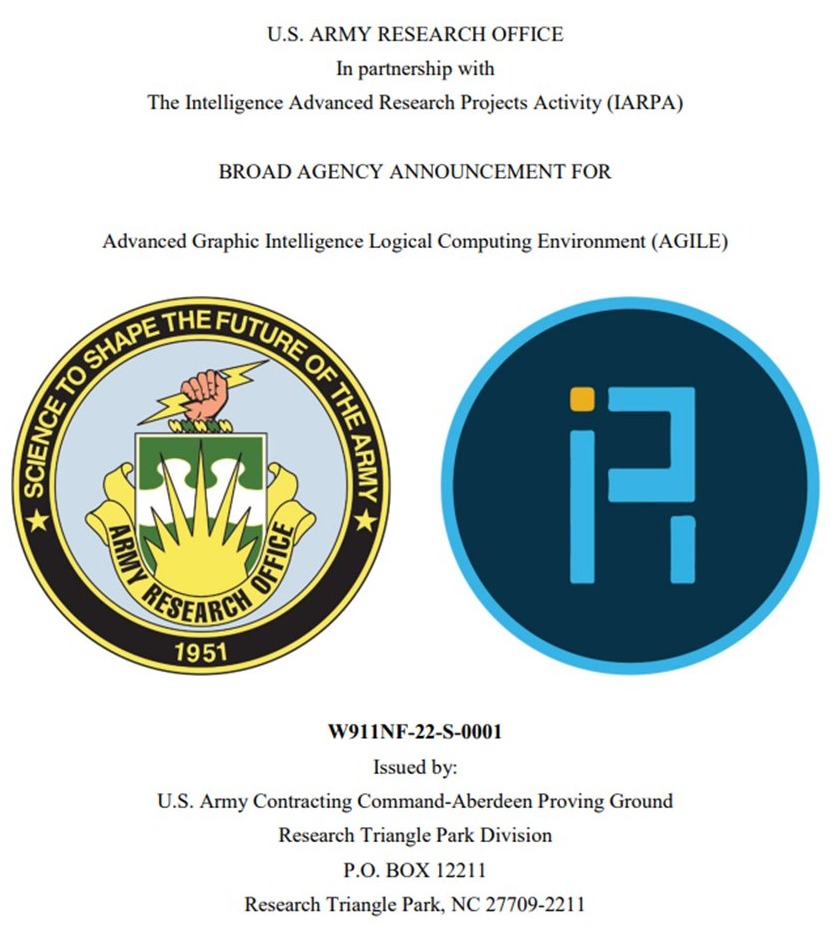
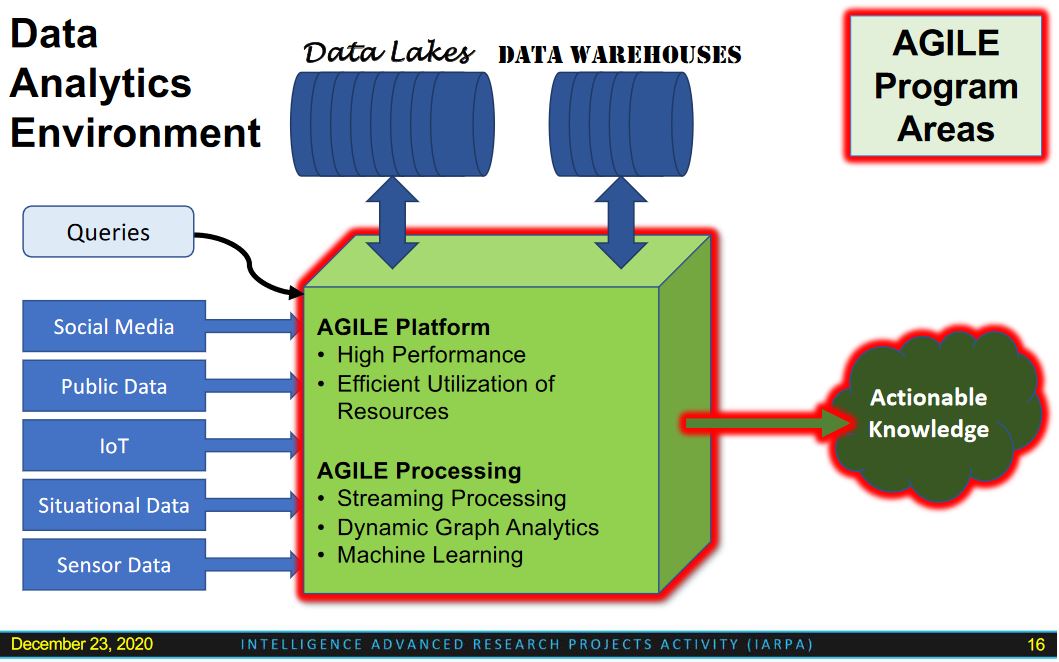

AGILE - development of new system level intelligent computation mechanisms for monitoring, analyzing, and predicting adversarial actions based on a complex, time-varying data matrix. 3-year program, beginning approximately June 2021 and extending through June 2024.
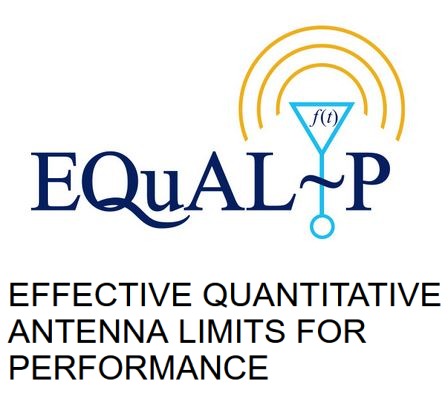
EQuAL-P - performance augmentation of electrically small antennas (ESAs) where the size of the antenna is significantly smaller than the wavelength of operation.
Big Data - DNA: The Ultimate Data-Storage Solution



IARPA MIST (Info & presentations from 2018)
Washington State Univ along with Microsoft Research is also involved in the IARPA DNA storage R&D.
From 2016:
Microsoft ($MSFT) has ordered 10 million strands of synthetic DNA from Twist Bioscience. The deal gives Microsoft the material to run research into the storage of digital data on DNA, a method that is tipped to enable the long-term housing of information in a relatively small amount of space.

Fun GCAT - Bio-security AI-driven software for rapid screening/flagging of “dangerous DNA sequences”, specifically referencing SARS-Cov-2 virus. The program began in June 2017 and will end in February 2022.




AGILE - development of new system level intelligent computation mechanisms for monitoring, analyzing, and predicting adversarial actions based on a complex, time-varying data matrix. 3-year program, beginning approximately June 2021 and extending through June 2024.

EQuAL-P - performance augmentation of electrically small antennas (ESAs) where the size of the antenna is significantly smaller than the wavelength of operation.

Rumors swirling Zelenski and Putin to talk peace, without Kissinger doing the translation even. Remember what I said at the beginning, ignore everything. If "Z" and "P" get to the table, and UNIFY, the HOUSE falls. If this were to happen the "I Support Ukraine" folks have to go "I want Ukraine bombed" aaaaaand, any and all of the dirty laundry of Joe, Hunter, Amy, JohnnyMac, Lindsey, Kerry, renOgade and Co. is all fair game. Remember the Clinton Era Treaty Vlad mentioned, Russia shares criminal information with the US, if Ukraine is "Russia" again, fair game all around.
What Military was Q referring to?
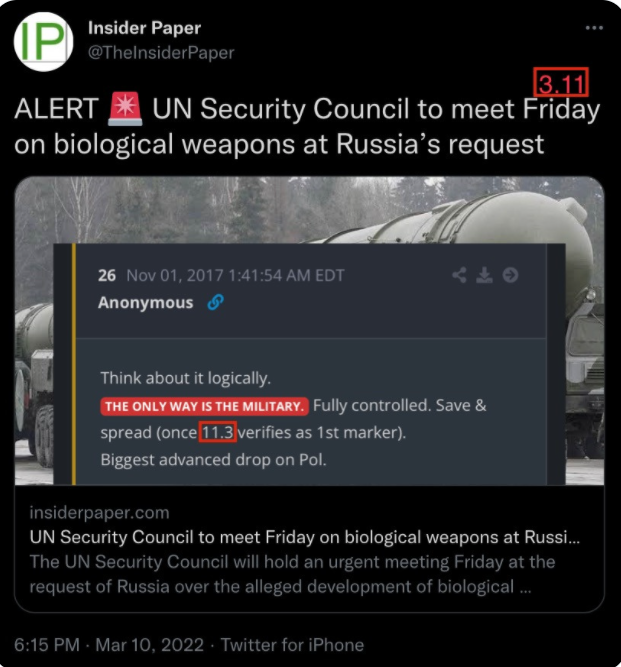
Why did Q drop sooooooo much on Ukraine? Why did Rudy make such a big deal about Ukraine? Why, despite that, was JOE put into the WH? Could DJT have survived this? Really, could MAGA or Anons and Q+ survived this implosion? It ALL FALLS ON Team renOgade stooge JOE, the very folks who created the mess.
If you love WEF and Soros, then the rejection of Putin makes sense. If you hate WEF and Soros, then their rejection of Putin makes sense. POV matters.

George is referring to THEIR, not our, but THEIR world. They want us dead, anytime any pewblickly known minion opens their mouth and says "OUR" they are not referring to the cattle they are trying to kill with the jabs - that really should be obvious by now.
They are not now, nor never have, spoken to the cattle.
OUR "democracy" OUR "alliance" OUR "way of life" quite literally means exclusively the elite minions and ONLY the elite minions and not one other person on earth.
Take every. single. thing. said by a minion and INVERT it by replacing us/population with "ELITE" minions and one can see exactly where they are at, exactly.
Now take everything they say and observe how they are without leadership at the top. Klaus Blowfeld is a stooge, GS, is a stooge, Joe is a stooge, hell the Roths are stooges. They were barely held together before being headless, now they are a mess and,,, ironically, are the most dangerous as they have nothing to loose at all, on any level.
a reply to: crankyoldman
GREAT Cranky!
Exactly.
And many of them don't have much left to live.
They are old.
They've been preparing their final move for a lifetime.
Think how they must feel now that they understand they WILL LOSE!
“Together we are standing up against some of the most sinister forces, entrenched interest and vicious opponents our people have ever seen.
But no matter how big or powerful these corrupt radicals may be.
You must never forget this nation does not belong to THEM, this nation belongs to YOU!”
“This is the year we’re going to take back the House, take back the Senate and take back America!”
"The Deep State must and will be brought to heel."
We are one movement, one people, under God
Together we are unstoppable
Our victory is inevitable
- President Trump NOW
Moves and countermoves.
These people are STUPID (& SICK).
Q
GREAT Cranky!
Exactly.
And many of them don't have much left to live.
They are old.
They've been preparing their final move for a lifetime.
Think how they must feel now that they understand they WILL LOSE!
“Together we are standing up against some of the most sinister forces, entrenched interest and vicious opponents our people have ever seen.
But no matter how big or powerful these corrupt radicals may be.
You must never forget this nation does not belong to THEM, this nation belongs to YOU!”
“This is the year we’re going to take back the House, take back the Senate and take back America!”
"The Deep State must and will be brought to heel."
We are one movement, one people, under God
Together we are unstoppable
Our victory is inevitable
- President Trump NOW
Moves and countermoves.
These people are STUPID (& SICK).
Q
edit on 12-3-2022 by duncanhidao because: (no reason given)
a reply to: CharlesNPope
Wow you are spot on about the music industry. I was a Pro Drummer & I got me break at Disneyland.
Then a few years later the artist I was playing for was 2 slots above Alanis Morissette in Top Billboard 100
when she won the Grammy for Best Artist Jagged Little Pill. Our record was an indie label plus the manager,
was also agent & record label owner. WTF! I was semi famous & was growing to the top working
hard me whole life, but this crap took a huge toll on me. Illegal to be manager, agent & record company owner
it's a huge conflict of interest. So I took a break & started working at a Veterinary Hospital got Tech Lic
& top of class & they pushed me into pre-Vet but due to age when I would grad. & owe $$$ I dropped out
of pre - med.
I miss playing music live on the big stage, the biggest high in the world no drugs needed.
Cheers
Ektar
Wow you are spot on about the music industry. I was a Pro Drummer & I got me break at Disneyland.
Then a few years later the artist I was playing for was 2 slots above Alanis Morissette in Top Billboard 100
when she won the Grammy for Best Artist Jagged Little Pill. Our record was an indie label plus the manager,
was also agent & record label owner. WTF! I was semi famous & was growing to the top working
hard me whole life, but this crap took a huge toll on me. Illegal to be manager, agent & record company owner
it's a huge conflict of interest. So I took a break & started working at a Veterinary Hospital got Tech Lic
& top of class & they pushed me into pre-Vet but due to age when I would grad. & owe $$$ I dropped out
of pre - med.
I miss playing music live on the big stage, the biggest high in the world no drugs needed.
Cheers
Ektar
a reply to: crankyoldman
Zelenskyy is the new Fauci for the MSM.
Should that make us wary of Zelenskyy ?
Zelenskyy is the new Fauci for the MSM.
Should that make us wary of Zelenskyy ?
a reply to: crankyoldman
Soros was rejected by his home country of Hungary. Trump was rejected by NYC. I guess a prophet is not without honor, except from his own peeps (lol).
So this Qosy Nostra thing has been going on for 40 threads now. Is the wandering and wondering finally over? Will there be a "Promised Land"? Is Russia, Ukraine and China about to double-cross the DS? Are we playing Kiev Survivor, No Holds Barred Edition??
True Story: I found out why they say no one is more patriotic than the immigrant. When Trump was running for election the first time, I met a Polish immigrant who had become a successful engineer in the USA and decided he wanted to be part of a political movement. So, he joined the Republican Party and was thrilled with all his new friends and the impressive gun collections. Eventually, he asked how he could contribute. When they found out his skill set, they told him to buy a bunch of computers and set them up at a particular location. He was a little surprised by that, but said, sure, no problem. When he notified the supervisor that the computers were functioning, suddenly a bunch of grandmas showed up and started political trolling on those computers like no tomorrow!! Then he went next level by attending a Trump rally at a nearby convention center. When Trump started bashing Hillary, there was a pregnant pause, and the overzealous Polish-American blurted out "K___ the B____" The entire audience gasped. Trump cleared his throat and the speech continued.
That's when the immigrant suddenly realized that there were limits even to political trash talking (lol). Incidentally, this same Polish transplant was also a huge Putin fanboy too. Maybe he had some Russian ancestry, or Putin has a following in Poland, I didn't want to go there (haha). After Trump won, I ran into the guy again and congratulated him on his achievement. He seemed perplexed at that. So, I'm not sure if Trump's shine had already worn off, or he felt he had only done his patriotic duty.
Soros was rejected by his home country of Hungary. Trump was rejected by NYC. I guess a prophet is not without honor, except from his own peeps (lol).
So this Qosy Nostra thing has been going on for 40 threads now. Is the wandering and wondering finally over? Will there be a "Promised Land"? Is Russia, Ukraine and China about to double-cross the DS? Are we playing Kiev Survivor, No Holds Barred Edition??
True Story: I found out why they say no one is more patriotic than the immigrant. When Trump was running for election the first time, I met a Polish immigrant who had become a successful engineer in the USA and decided he wanted to be part of a political movement. So, he joined the Republican Party and was thrilled with all his new friends and the impressive gun collections. Eventually, he asked how he could contribute. When they found out his skill set, they told him to buy a bunch of computers and set them up at a particular location. He was a little surprised by that, but said, sure, no problem. When he notified the supervisor that the computers were functioning, suddenly a bunch of grandmas showed up and started political trolling on those computers like no tomorrow!! Then he went next level by attending a Trump rally at a nearby convention center. When Trump started bashing Hillary, there was a pregnant pause, and the overzealous Polish-American blurted out "K___ the B____" The entire audience gasped. Trump cleared his throat and the speech continued.
That's when the immigrant suddenly realized that there were limits even to political trash talking (lol). Incidentally, this same Polish transplant was also a huge Putin fanboy too. Maybe he had some Russian ancestry, or Putin has a following in Poland, I didn't want to go there (haha). After Trump won, I ran into the guy again and congratulated him on his achievement. He seemed perplexed at that. So, I'm not sure if Trump's shine had already worn off, or he felt he had only done his patriotic duty.
edit on 12-3-2022 by CharlesNPope because: (no reason given)
originally posted by: carewemust
a reply to: duncanhidao
And Iran is dropping missiles on U.S. property in Iraq again.
www.abovetopsecret.com...
Why wouldn't they?
Biden is President.

We all remember how he purposefully mispronounced "China" "chyna," which, as noted here often word play is always by design (and I have no idea how he does it). Double meanings always in play.
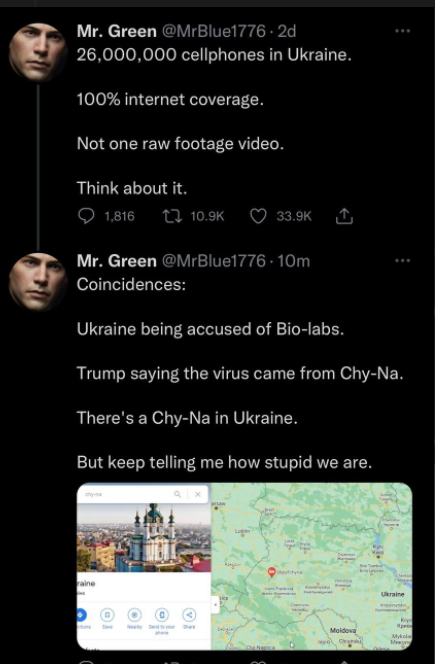

Urgency for Joe = pedo urges it seems.

I really want to know what replaces "Nazi, Hitler, Holocaust" in another timeline. Overplaying to say the least.
originally posted by: carewemust
a reply to: crankyoldman
Zelenskyy is the new Fauci for the MSM.
Should that make us wary of Zelenskyy ?
When I was growing up my friend was fired for every job he had due to stealing. He passed every lie detector and interview when asked about if he had been fired for stealing. He's an actor. [Z] is an actor.
a reply to: Ektar
Disney has a bad reputation for burning people out, particularly their film animation artists. Artists should not be treated like assembly line robots. A drummer friend of mine toured with Oscar Alston (post Rick James era). I miss real drums. The synth beats just don't have that organic feel. My same friend got a digital drum set that records directly into the computer, so he can now produce enhanced beats to distribute/sell to artists. You still play them like traditional drums, but it's much quieter. The neighbors appreciate it (haha). He also made his own green screen so he could perform virtual concerts from his house. Might be a way for you to get back into the game. But, it seems like a very tough world for real musicians. Maybe we should give up on the Veterinarian racket too and just get into the lucrative field of selling pet health insurance policies (lol). Who can afford to pay for pet care out-of-pocket any more? It costs almost as much to raise a pet as it does a kid.
Disney has a bad reputation for burning people out, particularly their film animation artists. Artists should not be treated like assembly line robots. A drummer friend of mine toured with Oscar Alston (post Rick James era). I miss real drums. The synth beats just don't have that organic feel. My same friend got a digital drum set that records directly into the computer, so he can now produce enhanced beats to distribute/sell to artists. You still play them like traditional drums, but it's much quieter. The neighbors appreciate it (haha). He also made his own green screen so he could perform virtual concerts from his house. Might be a way for you to get back into the game. But, it seems like a very tough world for real musicians. Maybe we should give up on the Veterinarian racket too and just get into the lucrative field of selling pet health insurance policies (lol). Who can afford to pay for pet care out-of-pocket any more? It costs almost as much to raise a pet as it does a kid.
edit on 12-3-2022
by CharlesNPope because: (no reason given)
a reply to: CharlesNPope
Lots of “suicide” in the music industry.
Courtney and Vicky made a great tag team.
Watch the wives
Lots of “suicide” in the music industry.
Courtney and Vicky made a great tag team.
Watch the wives
a reply to: CharlesNPope
Crazy FF if you think about Ukraine planting virii outside of Wuhan to maintain distance from their actual plan to CV-19 the election.
Crazy FF if you think about Ukraine planting virii outside of Wuhan to maintain distance from their actual plan to CV-19 the election.
As the world turns or burns in epic hypocrisy, I left Earth on the lunar highway for a few and revolved back to...
I wonder if the real purpose and mission of this system is to look for and monitor any cislunar UFO activity. We can't even keep Russia out of the Ukraine, or Chinese spies outta of our gov't, LOL.
Their plans for "archives" on the Moon, lunar bases and human habitation, and financial clearing, could all go up in vaporware if the electronics problem is not properly engineered, and now, they're in a race against time against those nations that are looking at bullion once again.
Also, they got a big problem if ET 👽 likes it as a basis of trade too. Maybe that's what an inter-planetary currency is all about.
After 50 years of NASA/space silence, our elites seem to behave like jealous children, whereby if they can’t have it nobody else can have it either. In this inverted upside down climate I wonder if they can even build such infrastructure.
"We don’t have the technology to go back to the Moon anymore because we destroyed that technology." 🤪🤣
― Don Pettit, NASA Astronaut.
Now ponder this R&D project:
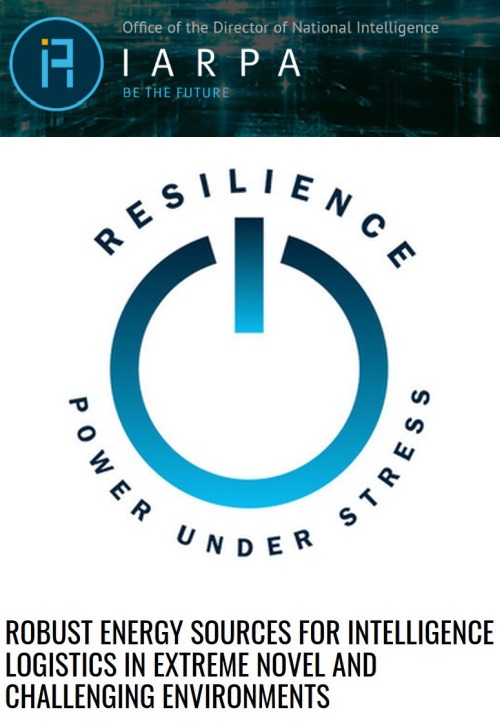
RESILIENCE: development of power solutions for increased run-time of electronics used by the IC. Potential UAVs and “leave-behind” electronics that must survive unattended for years under extreme environmental conditions.
CISLUNAR HIGHWAY PATROL SYSTEM (CHPS) (Mar, 1 2022)
The Cislunar Highway Patrol System is a spacecraft conceived at the Air Force Research Laboratory Space Vehicles Directorate that is designed to improve the United States Space Force’s ability to detect track and identify artificial objects operating at lunar distances and beyond, a range of 385,000 km. Most Space Force sensors are designed to detect and track satellites that are in Geo synchronous orbit (~36,000 km) distances or closer.
CHPS will search for unknown objects like mission related debris, rocket bodies, and other previously untracked cislunar objects, as well as provide position updates on spacecraft currently operating near the Moon or other cislunar regions that are challenging to observe from Earth.
How does it work?
The CHPS spacecraft will launch in 2025 out to an area of gravitational stability between the Earth and the Moon to test out techniques to monitor space traffic that travels through that area.
Why is it important?
In the next decade alone, the amount of traffic to the Moon as well as the lunar surface, is expected to increase significantly.
I wonder if the real purpose and mission of this system is to look for and monitor any cislunar UFO activity. We can't even keep Russia out of the Ukraine, or Chinese spies outta of our gov't, LOL.
NASA Funds Research for Moon Infrastructure Construction (March 6, 2022)
Researchers from the Colorado School of Mines, Missouri University of Science and Technology and Auburn University will develop construction technology and electronics for long-term colonies on the moon.
To make long-term missions more feasible, researchers led by Gertsch seek to develop electromagnetic and magnetic resource extraction techniques to separate lunar minerals like calcium, aluminum and magnesium needed for manufacturing.
Extreme Electronics
One of the biggest obstacles to space exploration is extreme temperatures that can render various types of technology useless.
“The surface of the moon can reach -415 degrees in specific locations. This is not the best environment for some electronic devices. To keep them warm, one approach is the utilization of heaters, but size and expense create difficulties,” a university spokesman told Government Technology. “To find an alternative to this problem, the proposal is to develop electric devices/components that have the capability of functioning over a wide temperature range, and not rely on warming devices, for future lunar missions.”
Their plans for "archives" on the Moon, lunar bases and human habitation, and financial clearing, could all go up in vaporware if the electronics problem is not properly engineered, and now, they're in a race against time against those nations that are looking at bullion once again.
Also, they got a big problem if ET 👽 likes it as a basis of trade too. Maybe that's what an inter-planetary currency is all about.
After 50 years of NASA/space silence, our elites seem to behave like jealous children, whereby if they can’t have it nobody else can have it either. In this inverted upside down climate I wonder if they can even build such infrastructure.
"We don’t have the technology to go back to the Moon anymore because we destroyed that technology." 🤪🤣
― Don Pettit, NASA Astronaut.
Now ponder this R&D project:

RESILIENCE: development of power solutions for increased run-time of electronics used by the IC. Potential UAVs and “leave-behind” electronics that must survive unattended for years under extreme environmental conditions.
a reply to: crankyoldman
CHYNA or CHINA?
CHYNA or CHINA?
edit on 12-3-2022 by duncanhidao because: (no reason given)
a reply to: duncanhidao
First Biden reveals that Russia will invade Ukraine.
Next Biden reveals that Russia will claim bio-weapons in Ukraine.
This is starting to look scripted.
Shouldn't Putin be negotiating with Z's Hollywood agent?
First Biden reveals that Russia will invade Ukraine.
Next Biden reveals that Russia will claim bio-weapons in Ukraine.
This is starting to look scripted.
Shouldn't Putin be negotiating with Z's Hollywood agent?
new topics
-
Something better
Dissecting Disinformation: 4 hours ago -
The Witcher IV — Cinematic Reveal Trailer | The Game Awards 2024
Video Games: 7 hours ago -
Friday thoughts
General Chit Chat: 8 hours ago -
More Ons?
Political Conspiracies: 8 hours ago -
Canada Post strike ended by the Government of Canada
Mainstream News: 8 hours ago
top topics
-
They Know
Aliens and UFOs: 12 hours ago, 18 flags -
Canada Banning more Shovels
General Chit Chat: 17 hours ago, 10 flags -
Something better
Dissecting Disinformation: 4 hours ago, 8 flags -
More Ons?
Political Conspiracies: 8 hours ago, 5 flags -
Friday thoughts
General Chit Chat: 8 hours ago, 5 flags -
Canada Post strike ended by the Government of Canada
Mainstream News: 8 hours ago, 4 flags -
The Witcher IV — Cinematic Reveal Trailer | The Game Awards 2024
Video Games: 7 hours ago, 2 flags -
Drones (QUESTION) TERMINATOR (QUESTION)
General Chit Chat: 14 hours ago, 1 flags
active topics
-
A Bunch of Maybe Drones Just Flew Across Hillsborough County
Aircraft Projects • 66 • : NoCorruptionAllowed -
DONALD J. TRUMP - TIME's Most Extraordinary Person of the Year 2024.
Mainstream News • 39 • : WeMustCare -
The Acronym Game .. Pt.4
General Chit Chat • 1012 • : FullHeathen -
USS Liberty - I had no idea. Candace Owen Interview
US Political Madness • 33 • : DEATHANDTRUTH -
And Here Come the Excuses!!
General Conspiracies • 201 • : cherokeetroy -
Something better
Dissecting Disinformation • 9 • : AlroyFarms -
The goal of UFO's/ fallen angels doesn't need to be questioned - It can be discerned
Aliens and UFOs • 15 • : Astrocometus -
They Know
Aliens and UFOs • 59 • : WeMustCare -
-@TH3WH17ERABB17- -Q- ---TIME TO SHOW THE WORLD--- -Part- --44--
Dissecting Disinformation • 3666 • : CarlLaFong -
Magic Vaporizing Ray Gun Claim - More Proof You Can't Believe Anything Hamas Says
War On Terrorism • 20 • : DEATHANDTRUTH

